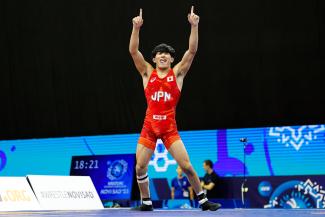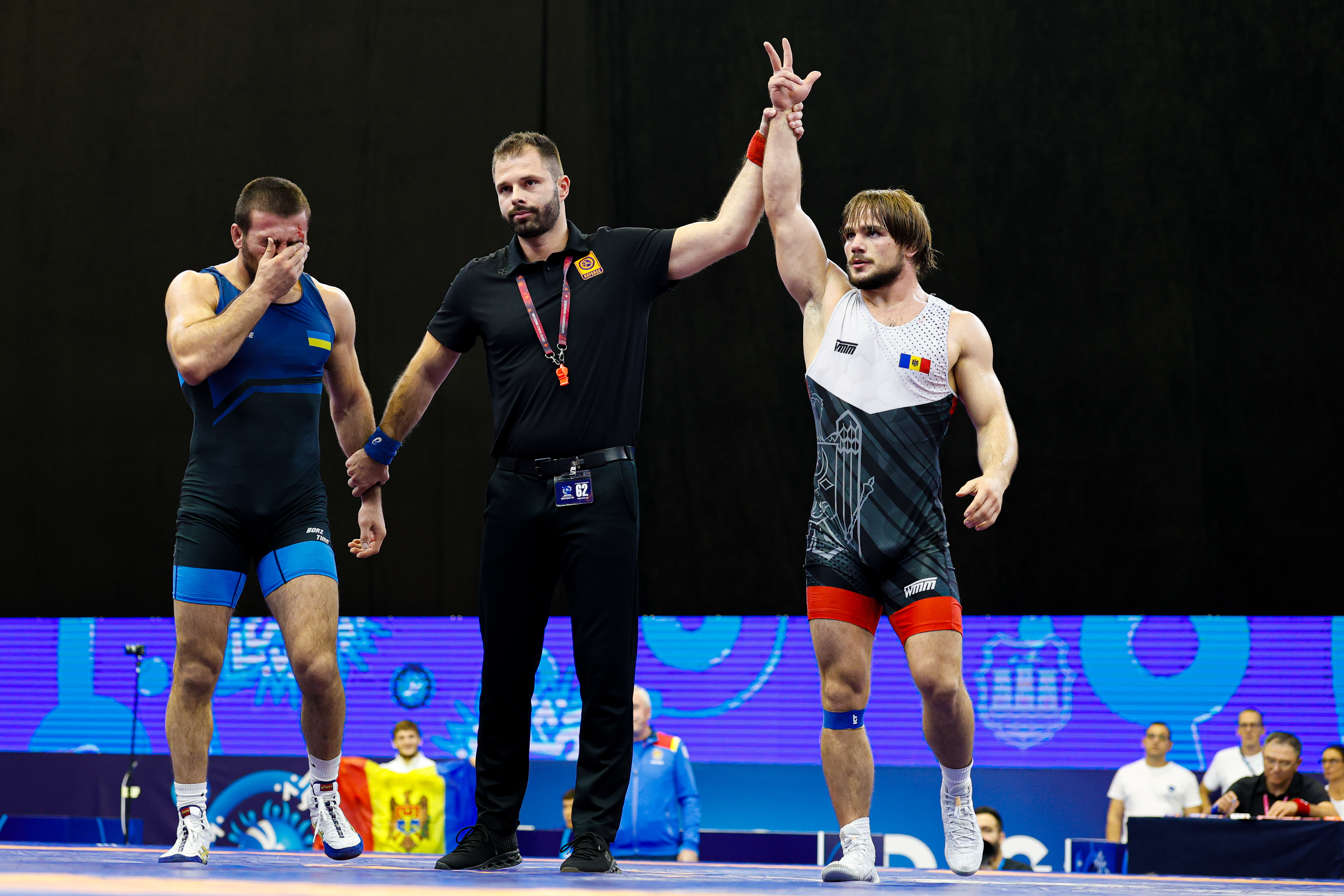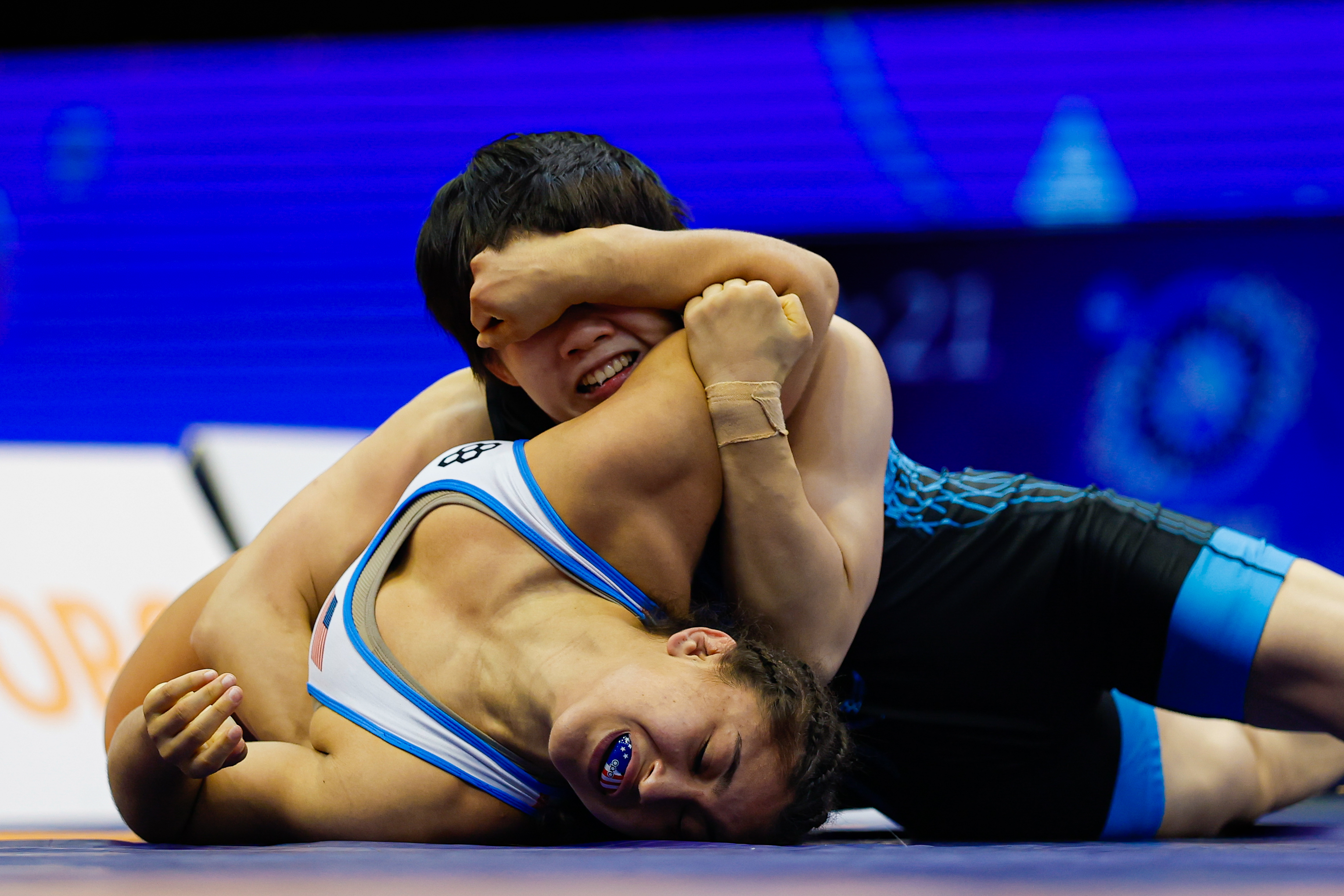Youngsters Shine in Greco-Roman; Tynybekova, Kawai Reach Semifinals
Tuesday, August 3, 2021 - 07:45 By Vinay Siwach

CHIBA, Japan (August 3) --- Out of the 49 wrestlers that took the mat Tuesday at the Makuhari Messe Hall in Chiba, 22 were world champions at the senior or age group level. By the end of the morning session eight remained in the hunt for the gold medal at the Tokyo Olympics.
Wrestling saw action in 67kg and 87kg in Greco-Roman and 62kg in women's wrestling as it entered day three of the Olympics in Chiba Prefecture, 20 kilometers from downtown Tokyo. Semifinals were decided in all three of the weight categories.
A host of upsets in the morning sessions gave way to young blood in the 67kg semifinals. Former cadet world champion Ramaz ZOIDZE (GEO) reached the semifinal after dumping Rio Olympic gold medalist Ismael BORRERO (CUB) in the opening round. Borrero was trailing 1-1 on criteria after giving up passivity in the second period. He went for a head pinch to get two points but instead gave up a takedown to trail 1-3. A late step out point was not enough as the defending champion lost 3-2.
Zoidze will face will face U23 world champion Mohammadreza GERAEI (IRI) in the semifinals as he upset three-time world champion Frank STAEBLER (GER) 5-5 in the quarterfinals. Staebler was leading 5-3 when the referees called for a leg-foul and it was awarded to Geraei. The two had one caution each and a similar scoring pattern but the Iran wrestler had the last point and was declared the winner.

The other semifinal will also see young guns Parviz NASIBOV (UKR) take on Mohamed ELSAYED (EGY). Multiple times age-group world medalist Nasibov claimed 2018 world champion Artem SURKOV (ROC) with a 1-1 score. The two had a passivity each but it was the Ukrainian who had it in the second period.
Elsayed had a frantic first bout against two-time world champion RYU Hansu (KOR) but hung in for a 7-6 win. In the quarterfinals he was in deep water against former junior world champion Karen ASLANYAN (ARM), but pulled out a 7-7 victory to reach the semifinals.
While it was youngsters who shone in 67kg, veterans ruled the 87kg weight class. In the final lap of his career, world champion Viktor LORINCZ (HUN) reached the semifinal and will take on Mohamed METWALLY (EGY). He defeated Atabek AZISBEKOV (KGZ) 6-1 in the first bout before he stopped Rio bronze medalist Denis KUDLA (GER) 1-1 in the quarterfinal.
Metwally was the surprise entry in the list as he won by technical superiority 9-1 over Individual World Cup winner Kiril MASKEVICH (BLR). He then pulled out a fall over Daniel GREGORICH HECHAVARRIA (CUB) to reach the semifinal.
Rio silver medalist and world champion Zhan BELENIUK (UKR) will take on Ivan HUKLEK (CRO) in the other semifinal at 87kg. Beleniuk continued his well planned strategy of trying to attack more in the second period, resulting in him winning the criteria lead.

In the first bout, he wrestled European champion Zurabi DATUNASHVILI (SRB) and won 3-1 after a big gut from par terre. Bachir SID AZARA (ALG) kept the match tighter, but it was Beleniuk gutting out the 1-1 win and trip to the semifinals.
Huklek removed Rio Olympic bronze medalist Rustam ASSAKOLO (UZB) in the quarterfinal with a 4-1 win. He began with a 5-3 win over John STEFANOWICZ (USA).
On the women's side, world champion Aisuluu TYNYBEKOVA (KGZ) booked her spot in the second straight Olympic semifinal and will take on Iryna KOLIADENKO (UKR). In 2016, Tynybekova lost her semifinal and later the bronze medal bout.
But she looked a wrestler on a mission as she defeated Anastasija GRIGORJEVA (LAT) 8-0 with those trademark double-leg takedowns. And just when it seemed that Kriszta INCZE (ROU) will be a problem, she exposed the Romanian to her back and won via fall.

Koliadenko also looks like the one to cause the upset as she won both her bouts via fall. First was Aminat ADENIYI (NGR) who was up 4-0 but the Ukrainian smashed her to the mat and the referee took their time but finally called it a pin. LONG Jia (CHN) was her next victim as she also suffered a fall in the first period itself.
Even if Tynybekova clears the semifinals, she will meet one of the two main rivals in the Olympic finals as KAWAI Yukako (JPN) and Taybe YUSEIN (BUL) made it to the semifinal from the other side of the bracket at 62kg.
Kawai, wrestling at her first Olympics, got her lace going against Liubov OVCHAROVA (ROC) to win 10-0 before she won 10-2 against a tiring Henna JOHANSSON (SWE). The Swede did give up a point for passivity but managed a takedown but Kawai came back stronger with a four pointer as well to win.
Yusein was also dominant in her two bouts as she got Bolortuya KHURELKHUU (MGL) in a arm-to-chest wrap and got the rolls for a 10-0 win in no time. But her opening win was 4-1 against Lais NUNES (BRA).
The semifinals will be followed by the medal bouts of the Greco-Roman 77kg and 97kg and women's 68kg weight classes.


 Alexandrin GUTU (MDA) won the 82kg final in Novi Sad. (Photo: United World Wrestling / Kostadin Andonov)
Alexandrin GUTU (MDA) won the 82kg final in Novi Sad. (Photo: United World Wrestling / Kostadin Andonov) Jinyue LIANG (CHN) tries to pin Audrey JIMENEZ (USA) in the 50kg final. (Photo: United World Wrestling / Kostadin Andonov)
Jinyue LIANG (CHN) tries to pin Audrey JIMENEZ (USA) in the 50kg final. (Photo: United World Wrestling / Kostadin Andonov)
Share your thoughts.
Comments